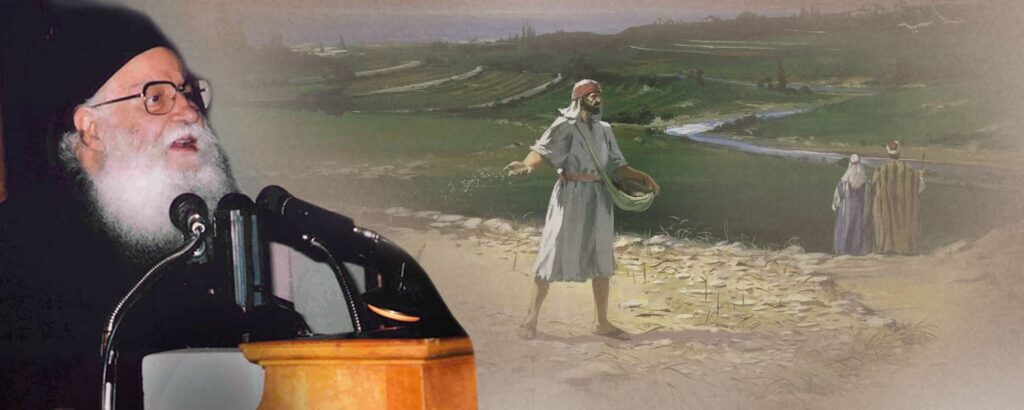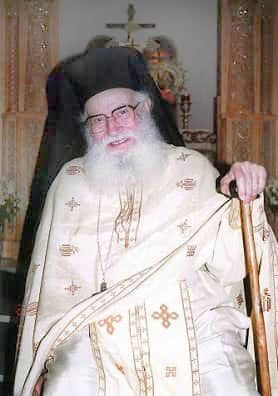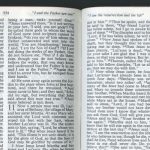
The usefulness of the parable and its value
The usefulness of the parable and its value - Fr. Athanasios Mitilinaios
Fourth Sunday of Luke and of the Fathers of the Seventh Ecumenical Council, Homily Β384
The Parable of the Sower (Luke 8: 5-15)
Today, my beloved, we heard the Parable of the Sower, which The Lord told in order to show to His listeners that not all were equally disposed toward His teachings. Through this parable, He shows that there were four categories of listeners.
There are those whose hearts were completely hardened towards the word of God; those whose hearts were shallow (about whom He says, “the seed fell upon the rock, and because it did not have moisture, it sprouted, but withered”); those on whom the seed fell on thorns (that is, those who, because of the cares of life, did not bother to develop the spiritual life.); but there is also “good soil”, the good heart, “on which,” He says, “the seed fell and produced a hundredfold.”
The Lord sees that a large crowd is gathering. Luke says: “And when a large crowd had gathered, having gone out from the city to Him, He spoke using a parable” (8:4). People, many people, a stream of people! But why did the Lord speak with a parable?
What is a Parable
It was the Lord’s custom to discourse using a parable. The parable is a short fictional story, however it contains believable events, which have different and varied goals. Take Aesop’s fables. One of them says that a crow was holding a bit of cheese in its beak, and the fox down below said to it, “O what a charming creature is the bird that sings...” This is not something believable, because foxes do not speak and neither do crows. Therefore they are fables, parables without real events. Although all the parables of Christ, as a rule, are fictional, they are believable stories. They have the force of reality.
The parable consists of a hidden divine contemplation which clarifies one’s thinking. Pay attention to this. Mark says: He did not speak to them without a parable (Mk. 4:34). The Lord conveyed a thought when He said: “Be on guard against every kind of greed” (Lk. 12:15), but He made clear, by way of a parable, the danger which exists there, greed, by relating the parable of the foolish rich man (Lk. 12:16-20).
In order to put the event of salvation into proportion, how many men are sinful and how many are acceptable before God, He related three parables: The parable of the lost drachma (Lk. 15:8-10), of the missing sheep (Lk. 15:4-7) and of the prodigal son (Lk 15:11-32). You see, the Lord makes a statement regarding behavior or faith and follows it up with a parable. Why? In order to make clear what He said.
The parable expresses the wealth of a thought which you can view from all angles. This is the advantage a parable has. Although you cannot say anything more within the constraints of the parable, you can, nevertheless, say very many things about it and draw many conclusions about reality when a parable is told. We will say, “The parable also means this, it also means that, and this too.”
The parable, moreover, my beloved, is a well-knit teaching, a single teaching with few words. With a single image, the entire teaching is encapsulated. There is a saying going around in our days, “a picture says a thousand words.” Take a picture of an event and publish it, a picture of some event that you cannot say a thousand words about, and it can be made into a lead story. It is the same with the parable. The parable is an image which contains it all, a way to see something all at once. (That fable which you say is something different, it is nonsensical.)
The parable, moreover, is a memorable teaching because it is dressed up with imagery, and when a teaching is dressed up with imagery, with some presentation, a man remembers it much better.
It is at the same time both a parable and a mine from which one can, in the future, however much he may change, broaden his knowledge from what is contained within it; from which he can draw out more and more, an inexhaustible amount of conclusions. Whatever may happen to a man, he can always turn to the parable to discover what it conceals and say, “Look, the parable means this.”
With the parable, what is inexpressible is expressed. A parable, then, is this: an image of a divine reality clothed in earthly garments. When the Lord wished to speak about the Kingdom of God, He said, “To what can I compare the Kingdom of Heaven?” (Lk. 13:18) He found a way, but with difficulty. What can I compare it to? He told three parables, not one, but three, and with each parable He could develop an aspect of the Kingdom of Heaven.2 The languages which we have created are poor and inadequate. We see this in everyday life. How many times have we found it difficult to switch from one language to another, to translate something, some sense of a word, some concepts. We do not find it easy. How much more when we express things which are inexpressible. Human language, then, is very very poor.
The parable, moreover, differentiates the listeners. “The value of the parable and its worth is obvious,” says the holy Chrysostom, “It makes a distinction between the one who is worthy and the one who is not worthy.”3 This is also the case here in the present parable of the Sower. There were those who went out to hear the Lord, but with what disposition? Out of curiosity? (We encounter this in other cases related by the holy Evangelists.) From mischievousness, like the Pharisees? For some superficial reason? Or from genuine desire? You can see here that the parable makes a distinction between the listeners.
The parable, moreover (and this is important), reveals and conceals, it makes clear and it darkens. It does both. The two are yoked. I repeat, it reveals and conceals. The parable is like the light [of God] the Hebrews had in Egypt. For them it was like a sunny day, but at the same time there in Egypt (this was the land of Goshen, a little southeast) the Egyptians were living in deep darkness. The holy historian tells us that the darkness “was felt” (Ex. 10:21).4 That is, they had to feel around in order to grasp something, whereas the Hebrews had dazzling light! This is what the parable is like. Some see and others do not see. The parable may clarify entirely for some and leave others in the dark. Listen to what Matthew writes:
“The disciples approached Him and said, ‘Why do You speak to them in parables?’ He replied, ‘To you it has been given to know the mysteries of the Kingdom of Heaven, but to these it has not been given.’” (Lk. 8:10, Mt. 13:11)
“For whoever has, more will be given to him; but whoever does not have, even what he has will be taken away” (Lk. 19:26, Mt. 25:29). That is, if you have a little of the Spirit of God, if your eyes are well-disposed to it, then you will be able to distinguish very many conclusions. On the other hand, if you really have something, but do not have faith within and cannot discern that which you have, God will take this from you. Does this not make an impression?
Why did the Lord speak in parables?
“This is why I speak to them in parables, that seeing they may not see and hearing they may not understand” (Is. 6:9, Mt. 13:15). You will say to me: “Are you saying that the Lord does not want all to understand?” That is not what we are saying, my beloved, because understanding depends on your disposition when approaching the word of God. The word of God is sealed with seven seals. There are seven seals if one does not have a good disposition. This is why many who do not have the Spirit of God read Holy Scripture and call it nonsense. Do you want to know something more? They also scorn the teachings and blaspheme them. This is because they do not have the Spirit of God. They see but do not see, they hear, but do not hear. He says: “Here is the meaning. You still do not hear? Even now you don’t get the message?” and says to them, “You are blind” (Is. 42:18; Mt. 23:16,17,19,24,26). “Blind?” they say, “We see and hear you!” “No,” He says, “if you were seeing, you would be standing in front of me differently.” (Jn. 9:40-41)
“Blessed are your eyes that see and ears that hear” (Lk. 10:23). Which eyes? The eyes of the soul. Which ears? The ears of the soul. You are blessed. You see here, then, a differentiation is made. Some like this, some like that.
You will say to me, “Why is it this way?” My beloved, because of God’s love for man, so that the scoffers will not to be punished more severely. Do you know what He will say to the scoffer? Something dreadful! You see, but you disregard it, you do not respect it, but turn your back on it. Saint Theophylacht says,
“Christ conceals these things from them so that they will not be judged more severely, as ones who know the mysteries and scorn them; it is for their sake that Christ conceals these things from them, for upon knowing and then scorning, they deserve grave punishments.”
Beloved, the key to interpreting and comprehending all of Holy Scripture, both the natural events and the parables, is obvious. It is Christ. Do you believe in Christ? You will find in Holy Scripture an astonishing revelation; both the Old and New Testament will speak to you continually about Christ. However, if you do not believe, you will not profit, you will understand nothing.
The flesh of Christ, the human nature of the Logos of God, is like the parable. You see [the man], but you do not see [the divinity]. Some of those listening to Christ say: “What is that man saying?” They understand nothing.
What did the disciples say? Explain to us what You said (Luke 8:9). The holy Chrysostom says: “The Holy Spirit is the Maker of other eyes.” Do you have the Holy Spirit? Then you see what others do not see, those who do not have the Holy Spirit. The Holy Spirit changes our eyes. He creates new eyes for us, spiritual eyes. And so, my beloved, we also must have the Holy Spirit to live, for our eyes to open.
Can I tell what kind of listener of the word I am? Hardened? Obstinate? Superficial? Shallow? Or good soil? You can make a self-examination using today’s parable. To tremble. To be corrected. To be saved. Amen.
- The mustard seed (Lk. 13:19, cf. Mt. 13:31, Mk. 4:31), leaven (Lk. 13:21; cf. Mt. 13:33), narrow door (Lk. 13:22). [Three additional parables about the Kingdom of Heaven are related by the Evengelist Matthew: The hidden treasure in the field (Mt. 13:44); the pearl of great price (Mt. 13:45); the net (Mt. 13:47)
- Explanation of the Psalms. Psalm 48, #3, PG 47-64
- “And the Lord said to Moses, ‘Stretch out your hand to heaven, and let there be darkness over the land of Egypt—darkness that may be felt.’” (Ex. 10:21)



